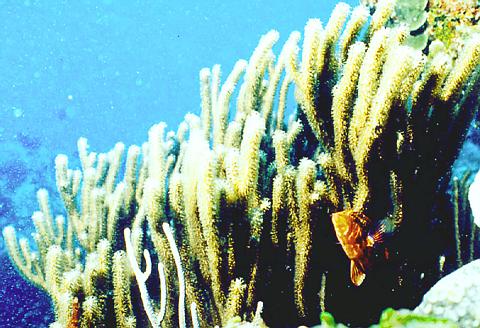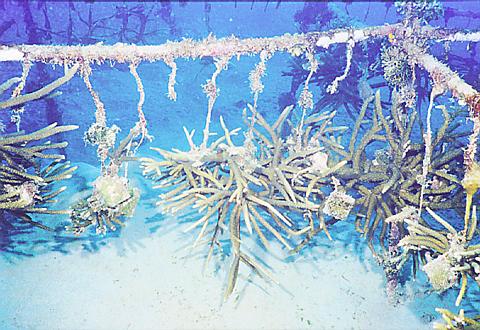Scientists studying coral reefs in Nanwan (
Such bleaching can be caused by disease or adverse changes in the environment around coral colonies, such as increased levels of UV radiation and excessive water temperatures.
At the time, the Third Nuclear Power Plant (

FILE PHOTO
The scientists, Fang Li-hsing (
The bleaching, they said, could be detected as far as 1.5km west of the pipes, and as deep as six meters below the surface, according to data collected by seven monitoring instruments deployed near the pipes.
At the time, coral bleaching was a newly-discovered phenomenon; work on its causes and effects has progressed steadily since.

FILE PHOTO
More than a decade later, Soong Ker-yea (宋克義), a professor of marine biology at the university, is continuing the tough tasks of both monitoring the site's ecological systems and attempting recovery work on the coral.
Current situation
Scientists and officials at the nuclear power facility are cautious when assigning blame to the problem.
"First of all, I should stress that damage to coral reefs in Taiwan's waters can be attributed to both natural and man-made factors," Soong said at a recent press conference held by officials at the nuclear power plant.
He explained that several problems, including over-fishing, water pollution, poaching of both coral and marine animals in addition to the construction of a causeway nearby had acted together to destroy some of the coral.
Composed of the calcified exoskeletons of colonies of marine polyps, coral reefs are among the richest, most productive ecosystems on the planet.
"Coral reefs, which are home to at least 35,000 marine species, exist in only 3 percent of the world's waters," Soong said, adding that Taiwan itself was surrounded by coral reefs.
Soong has begun a coral reef recovery program with assistance from Taipower. It involves work both in the field and in laboratories equipped to observe the properties of growing coral.
Showing reporters photographs taken in waters nearby, Soong said that the program would be able to propose measures to prevent more such environmental catastrophes, and find remedies to halt the deterioration of affected coral reefs.
Soong said that coral bleaching is a growing problem around the globe, and that up to70 percent of existing coral could actually disappear within 40 years, based on data from the US National Oceanic and Atmospheric Administration (NOAA), which has been engaged in global coral reef monitoring work for several years.
"We realize that coral reefs are being destroyed at an alarming rate, but it's hard for us to know precisely where and how much coral bleaching is happening, because of difficulties monitoring conditions underwater," Soong said.
Soong said that several foreign studies have strongly implicated gradual warming of the world's oceans as a major cause of coral reef bleaching.
"Coral is protected from UV light by chlorophyl-containing algae in a symbiotic relationship. But the algae is sensitive to elevated water temperatures, which hinder the process of photosynthesis in the organisms," Soong said.
Less algae means more damaging UV light can reach the coral, resulting in the death of coral colonies.
Hot water from nuclear power plants, he added, has been identified as the main reason for coral bleaching in areas near the Nanwan facility since the phenomenon was brought to light for the first time in Taiwan 11 years ago.
Sharing the blame
Aside from concerns over potential radiation leaks, nuclear power plants are still being targeted by environmentalists for their adverse effects on coral reefs.
In 1987, authorities at the Third Nuclear Power Plant, working together with academics, initiated a comprehensive monitoring and restoration project in coastal areas in southern Taiwan,
"The heat damage to coral reefs and the impact on marine ecology caused by hot water from the plant by itself is limited.
"We have taken action to control variations in the temperature of the water around affected reefs to within 4℃, which is bearable for coral," said Tu Yueh-yuan (杜悅元), director of Taipower's environmental protection department (台電環保處).
"In addition, we are working with the Tungkang Fisheries Research Institute (
"We have been very careful about [coral bleaching]. It's not reasonable to ask for the removal of the power plant just for the sake of the coral," said Tu, adding that the site was chosen for construction of the nuclear plant 15 years ago, before plans were made for Kenting National Park (
Taipower officials added that other factors also blamed for the coral bleaching should be investigated.
Officials said that due to the now-booming sightseeing business in Kenting -- which draws more than 3 million tourists every year -- increased sewage discharge in the area has polluted the waters, causing additional damage to nearby coral.
They added that proper environmental protection should be carried out by collaboration among different governmental administrative units.
A good example, they said, was a recently-completed sewage treatment network in the Nanwan area.
Construction of the sewerage system cost NT$610 million and has been in operation since last January. It can treat 3,000 tonnes of sewage daily, they said.
"Everyone should play their part in protecting our treasured environment," said Chen Pu-tsan (

GEARING UP: An invasion would be difficult and would strain China’s forces, but it has conducted large-scale training supporting an invasion scenario, the report said China increased its military pressure on Taiwan last year and took other steps in preparation for a potential invasion, an annual report published by the US Department of Defense on Wednesday showed. “Throughout 2023, Beijing continued to erode longstanding norms in and around Taiwan by employing a range of pressure tactics against Taiwan,” the report said, which is titled “Military and Security Developments Involving the People’s Republic of China (PRC) 2024.” The Chinese People’s Liberation Army (PLA) “is preparing for a contingency to unify Taiwan with the PRC by force, if perceived as necessary by Beijing, while simultaneously deterring, delaying or denying

PEACEFUL RESOLUTION: A statement issued following a meeting between Australia and Britain reiterated support for Taiwan and opposition to change in the Taiwan Strait Canada should support the peaceful resolution of Taiwan’s destiny according to the will of Taiwanese, Canadian lawmakers said in a resolution marking the second anniversary of that nation’s Indo-Pacific strategy on Monday. The Canadian House of Commons committee on Canada-Chinese relations made the comment as part of 34 recommendations for the new edition of the strategy, adding that Ottawa should back Taiwan’s meaningful participation in international organizations. Canada’s Indo-Pacific Strategy, first published in October 2022, emphasized that the region’s security, trade, human rights, democracy and environmental protection would play a crucial role in shaping Canada’s future. The strategy called for Canada to deepen

QUICK LOOK: The amendments include stricter recall requirements and Constitutional Court procedures, as well as a big increase in local governments’ budgets Portions of controversial amendments to tighten requirements for recalling officials and Constitutional Court procedures were passed by opposition lawmakers yesterday following clashes between lawmakers in the morning, as Democratic Progressive Party (DPP) members tried to block Chinese Nationalist Party (KMT) legislators from entering the chamber. Parts of the Public Officials Election and Recall Act (公職人員選舉罷免法) and Constitutional Court Procedure Act (憲法訴訟法) passed the third reading yesterday. The legislature was still voting on various amendments to the Act Governing the Allocation of Government Revenues and Expenditures (財政收支劃分法) as of press time last night, after the session was extended to midnight. Amendments to Article 4

‘ONE BRIDGE’: The US president-elect met with Akie Abe on Dec. 15 in Florida and the two discussed a potential Taiwan-China conflict’s implications for world peace US president-elect Donald Trump has described Taiwan as “a major issue for world peace” during a meeting with Akie Abe, the widow of late Japanese prime minister Shinzo Abe, Japanese newspaper the Yomiuri Shimbun quoted sources as saying in a report yesterday. Trump met with Akie Abe on Dec. 15 at the Mar-a-Lago estate in Florida, where the two discussed the Russo-Ukrainian war and the situation in the Taiwan Strait. During the meeting, Trump spoke on the implications for world peace of a potential Taiwan-China conflict, which “indicated his administration’s stance of placing importance on dealing with the situation in